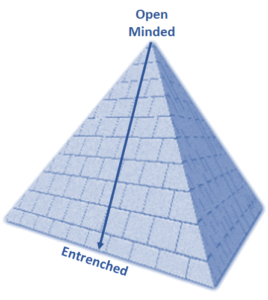Have you ever had the experience of looking at family members, friends, or colleagues and thinking: How could these intelligent, thoughtful, sane persons believe in [name that topic] despite all the evidence to the contrary? You may even try to influence their perspectives with facts only to find that they double down on their positions. Guess what? It’s not about them. It’s human nature. And we all have blind spots. Carol Tavris and Elliot Aronson explore this terrain in Mistakes Were Made (But Not By Me): Why We Justify Foolish Beliefs, Bad decisions, and Hurtful Acts.
 Tavris and Aronson claim that the engine that drives this phenomenon is cognitive dissonance. It’s a state of being when we hold true two disparate concepts in our minds at the same time. It makes us really, really uncomfortable, so we’ll go to great lengths to quell the contradiction. As a case in point, we can’t reconcile a self-image that says “I am a sensible, competent person” with the notion that “I’ve advocated a belief that is categorically wrong.” So, we’ll let in all of the arguments that continue to reinforce our belief and find ways to discount that which contradicts it.
Tavris and Aronson claim that the engine that drives this phenomenon is cognitive dissonance. It’s a state of being when we hold true two disparate concepts in our minds at the same time. It makes us really, really uncomfortable, so we’ll go to great lengths to quell the contradiction. As a case in point, we can’t reconcile a self-image that says “I am a sensible, competent person” with the notion that “I’ve advocated a belief that is categorically wrong.” So, we’ll let in all of the arguments that continue to reinforce our belief and find ways to discount that which contradicts it.
Tavris and Aronson use a pyramid as a representation of how we form (and stick to) beliefs. When we’re sitting at the top of the pyramid, we’re open to seeing all of its facades. If we start heading south on one of its sides, we can still climb back up to the top if we catch ourselves early in the descent. But the further we traverse down that side, the greater the commitment to sticking with it. When we get to the bottom, it’s the only perspective that we can support. Moreover:
“The more costly a decision in terms of time, money, effort, or inconvenience and the more irrevocable its consequences, the greater the dissonance and the greater the need to reduce it by overemphasizing the good things about the choice made.”
The source of much dissonance lies in our beliefs that we are smarter, nicer, more ethical, more competent, more reasonable, more humble, etc. than average. We go to great pains to preserve these self-concepts and filter our daily experience through them. We may not even be aware consciously of all the little lies we tell ourselves and blind eyes we turn to prevent the acknowledgement that we’ve made mistakes and foolish decisions, or committed harmful acts. To do so would threaten our sense of self. Moreover, our neuro-wiring comes with a predisposition to distort memory in ways that cause us to forget discrepant and discomforting information.
The book explores case studies of self-justification in relationships, psychotherapy, academia, business, politics, the judiciary, science, and medicine. It exposes the dark side of prejudice and how our we/they sensibilities can cause us to justify mistreatment of those we perceive as different/inferior. It provides ample evidence of self-justification’s universality and the great harm it causes when left unchecked.
Knowing how dissonance works will not make us immune to its effects. We all have psychological blinds spots. However, we can strive to bring them into awareness and catch ourselves before getting into trouble. Some tips:
- Acknowledge the fact that we believe our judgements to be less biased and more independent than others and that our dialog partners feel the same way. Make an effort to be attentive, respectful, and curious about their perspectives. Ask questions. Explore. Give them the benefit of the doubt. You’re more likely to preserve relationship and just may learn something!
- Check memories with independent accounts to increase the likelihood that you’ll approach the truth rather than your brain’s sanitized perspective.
- Beware of culturally entrenched convictions – e.g., venting anger makes you feel better. (It doesn’t. It escalates anger.) Look for objective data from controlled experiments funded by neutral parties to guide your thinking.
- Discuss major decisions with persons who (like you) are still in the process of making them. Don’t rely on testimonials as these witnesses will be steeped in self-justification.
- When feeling hostility toward a person or group, do a generous deed in their behalf. You’ll start to see them in a warmer light. It’ll also encourage generosity toward others (“virtuous circle”).
At the end of the day, the authors tell us:
“Our greatest hope of self-correction lies in making sure we are not operating in a hall of mirrors in which all we see are distorted reflections of our own desires and convictions. We need a few trusted naysayers in our lives, critics who are willing to puncture our protective bubble of self-justifications and yank us back to reality if we veer too far off.”